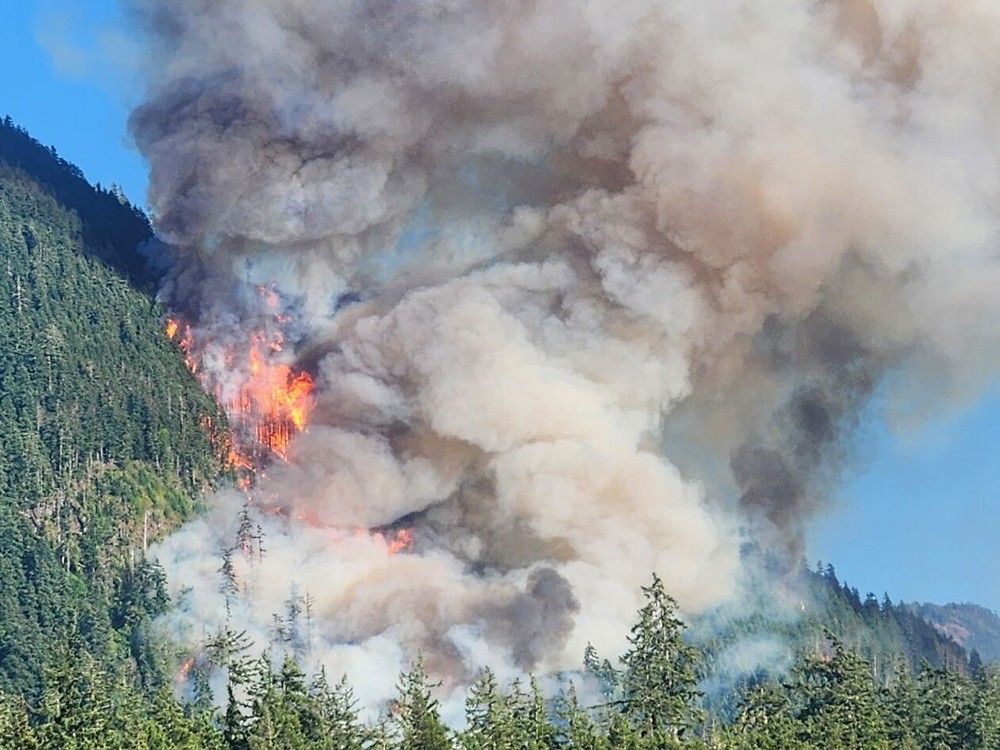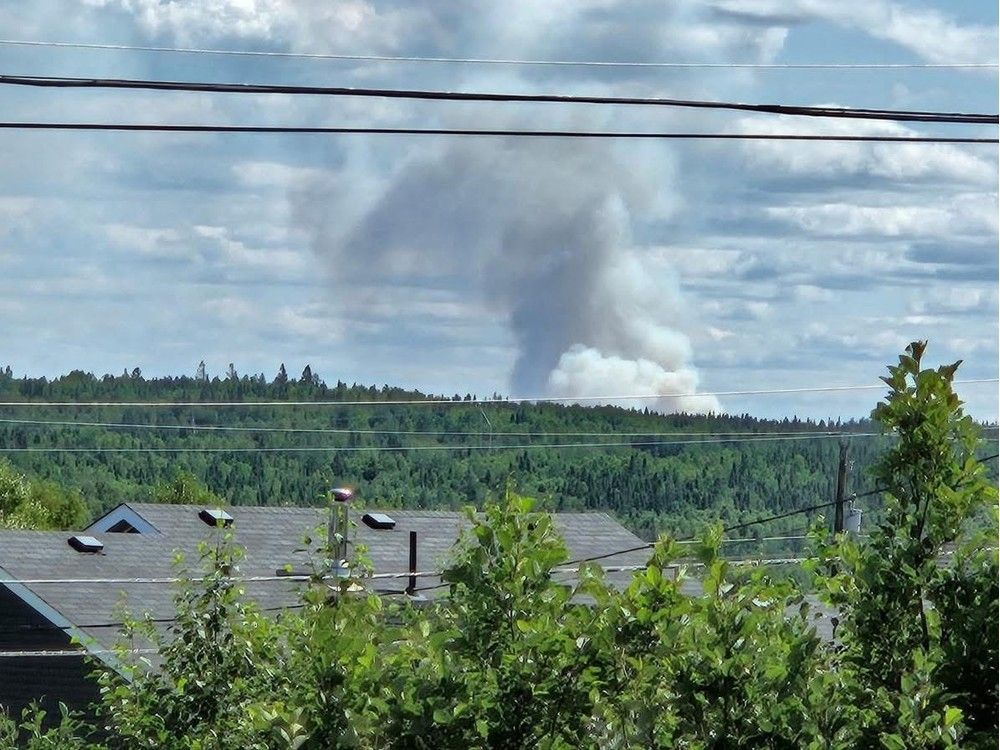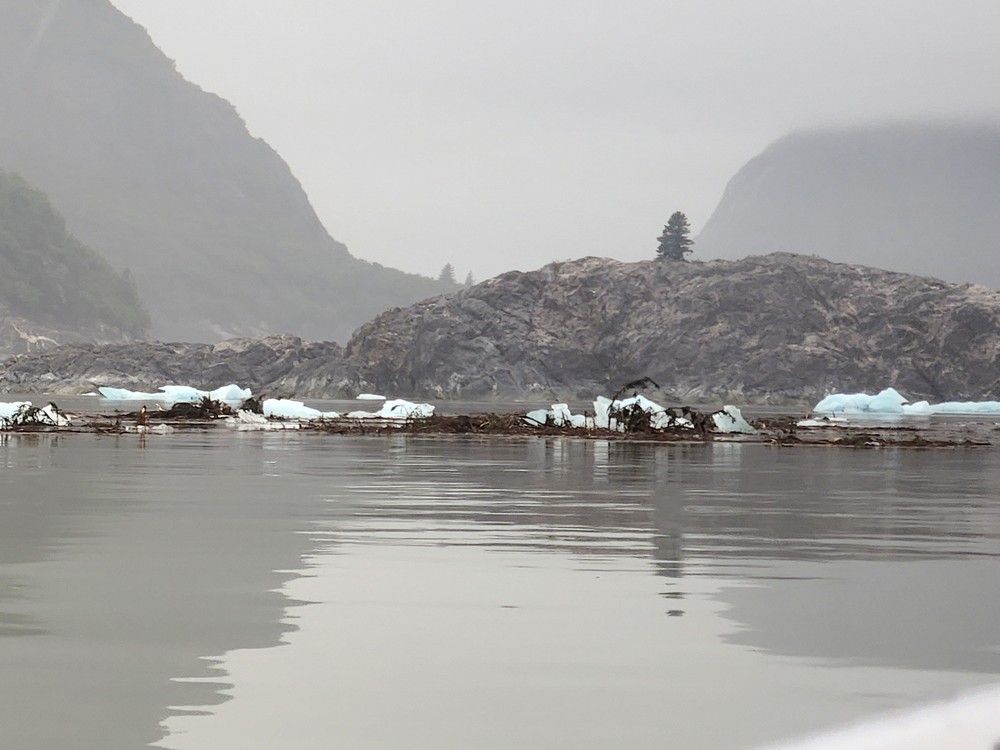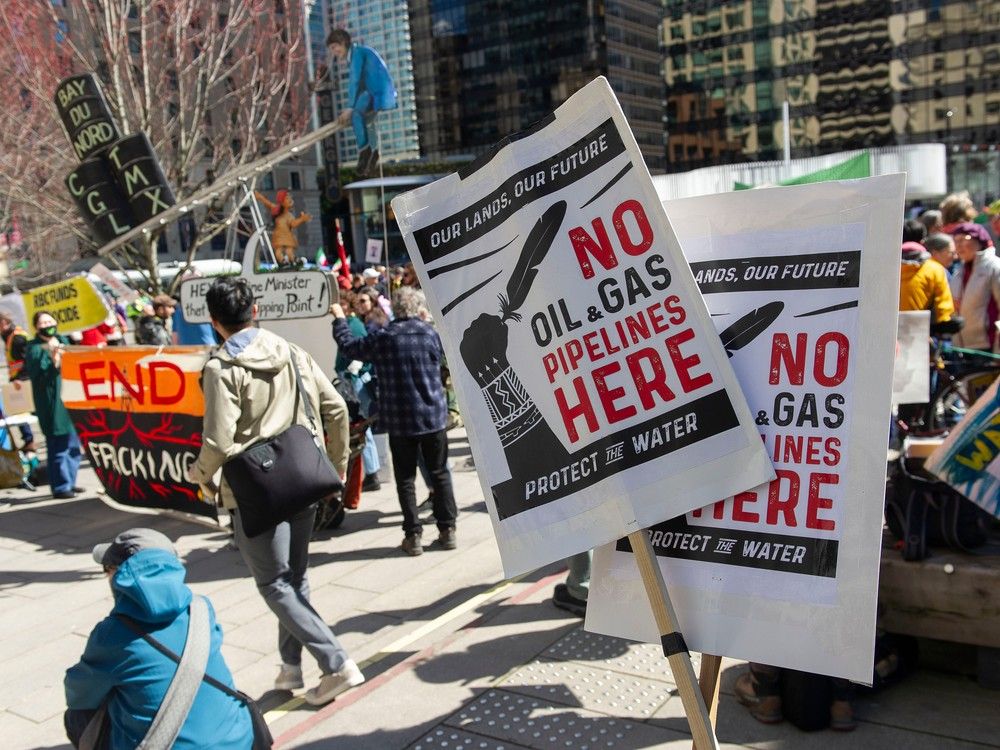
Here’s the latest news concerning climate change and biodiversity loss in B.C. and around the world, from the steps leaders are taking to address the problems, to all the up-to-date science.
Check back every Saturday for more climate and environmental news or sign up for our Climate Connected newsletter HERE.
In climate news this week:
• Vancouver Island wildfire grows by more than half, but rain helping
• Officials say the largest wildfire in Newfoundland has destroyed up to 100 homes
• ‘Total chaos’: Kayakers narrowly escape tsunami caused by mega-landslide near Alaskan fiord
• Failed plastics negotiations in Geneva leave world few options to confront growing pollution crisis
Human activities like burning fossil fuels and farming livestock are the main drivers of climate change, according to the UN’s intergovernmental panel on climate change. This causes heat-trapping greenhouse gas levels in Earth’s atmosphere, increasing the planet’s surface temperature.
The panel, which is made up of scientists from around the world, including researchers from B.C., has warned for decades that wildfires and severe weather, such as the province’s deadly heat dome and catastrophic flooding in 2021, would become more frequent and intense because of the climate emergency. It has issued a code red for humanity and warns the window to limit warming to 1.5 C above pre-industrial times is closing.
According to NASA climate scientists, human activities have raised the atmosphere’s carbon dioxide content by 50 per cent in less than 200 years, and “there is unequivocal evidence that Earth is warming at an unprecedented rate.”
As of Aug. 5, carbon dioxide in the atmosphere was 427.87 parts per million, slightly down from 429.61 ppm last month, according to NOAA data measured at the Mauna Loa Observatory, a global atmosphere monitoring lab in Hawaii. The NOAA notes there has been a steady rise in CO2 from under 320 ppm in 1960.

Climate change quick facts:
• The Earth is now about 1.3 C warmer than it was in the 1800s.
• 2024 was hottest year on record globally, beating the record in 2023.
• The global average temperature in 2023 reached 1.48 C higher than the pre-industrial average, according to the EU’s Copernicus Climate Change Service. In 2024, it breached the 1.5 C threshold at 1.55 C.
• The past 10 years (2015-2024) are the 10 warmest on record.
• Human activities have raised atmospheric concentrations of CO2 by nearly 49 per cent above pre-industrial levels starting in 1850.
• The world is not on track to meet the Paris Agreement target to keep global temperature from exceeding 1.5 C above pre-industrial levels, the upper limit to avoid the worst fallout from climate change including sea level rise, and more intense drought, heat waves and wildfires.
• On the current path of carbon dioxide emissions, the temperature could increase by as much 3.6 C this century, according to the IPCC.
• In June 2025, global concentrations of carbon dioxide exceeded 430 parts per million, a record high.
• Emissions must drop 7.6 per cent per year from 2020 to 2030 to keep temperatures from exceeding 1.5 C and 2.7 per cent per year to stay below 2 C.
• There is global scientific consensus that the climate is warming and that humans are the cause.
• Scientific information taken from natural sources (such as ice cores, rocks, and tree rings) and from modern equipment (like satellites and instruments) all show the signs of a changing climate.
(Sources: United Nations IPCC, World Meteorological Organization, UNEP, NASA, climatedata.ca)
Latest News
Vancouver Island wildfire grows by more than half, rain is on the way
A forecast of up to 40 millimetres of rain is expected to help firefighters battling a wildfire that has been raging near Port Alberni on Vancouver Island this week.
The Mount Underwood fire that has triggered evacuation orders and alerts measured more than 34 square kilometres on Thursday, about 58 per cent larger than the day before.
The fire had displayed some of the most extreme types of activity this week, racing up hillsides and setting the forest crown ablaze. But an update from the B.C. Wildfire Service on Thursday said crews working the blaze overnight saw “moderate” fire behaviour, as cooler temperatures and higher humidity moved into the area.
The update said southwest winds would “continue to push the fire in a northeasterly direction,” which is away from urban areas.
—The Canadian Press
Wildfire raging near Port Alberni shows vigorous, ’unusual’ behaviour
A raging wildfire that has forced evacuations on south-central Vancouver Island has been burning at some of most severe levels of fire behaviour, a display that is “unusual” for the region, the B.C. Wildfire Service said.
An update posted by the service said the blaze, located about 12 kilometres south of Port Alberni, has been burning at rank four and five on a six-point scale.
“This is a highly vigorous surface fire with torching or passive crown fire and some active crown fire,” the service said in an update on Wednesday.
“This is unusual fire behaviour for wildfires on Vancouver Island.”
The Mount Underwood fire was discovered Monday afternoon and has since grown to more than 20 square kilometres.
—The Canadian Press

Largest wildfire in Newfoundland has destroyed up to 100 homes: officials
Officials say the largest wildfire burning in Newfoundland and Labrador may have destroyed up to 100 homes and structures.
However, Premier John Hogan says it is still too dangerous for crews to get into the area to complete an accurate tally.
The fire burning along the northwestern shore of Conception Bay began on Aug. 3 near Kingston, N.L., and Hogan says it now measures more than eight square kilometres.
Meanwhile, Forestry Department spokesman Jamie Chippett says improving weather has helped slow the wildfire burning near St. John’s, but it is still burning in the ground and considered out of control.
—The Canadian Press
Roughly 20,000 people under wildfire evacuation alert in Newfoundland and Labrador
Thousands of people in Newfoundland and Labrador’s capital and elsewhere in the province are under evacuation alerts as wildfires continue to threaten communities.
About 5,400 residents in two areas of St. John’s were told on Tuesday to be ready to leave their homes at a moment’s notice.
They joined roughly 15,000 others in parts of the nearby communities of Paradise and Conception Bay South who were placed under evacuation alerts a day earlier.
The wildfire threatening the towns was about 250 metres from the Trans-Canada Highway on Tuesday night.
Members of the Canadian Armed Forces and the coast guard are helping deliver supplies and support.
Nine wildfires are burning in the province, including at least four that are classified as out of control.
—The Canadian Press

‘Total chaos’: Kayakers narrowly escape tsunami caused by mega-landslide near Alaskan fiord
Three kayakers camping in southeast Alaska, near where it borders with B.C., awoke Sunday to the roaring swoosh of water outside their tent.
A freak tsunami triggered by a huge landslide — big enough to initially register as a 5.0-magnitude earthquake — had surged down a fiord, sweeping away their camping gear, including a kayak they had stored under a tarp.
“It was absolutely roaring. We had to yell at each other even from just a few feet away,” recalled Nick Heilgeist, a kayaking instructor from Seattle.
Heilgeist and two of his kayaking instructor friends were 75 days into an 80-day paddling trek to Alaska from Washington.
The landslide at the upper end of Tracy Arm, a fiord about 80 kilometres southwest of Juneau, had sent hundreds of millions of cubic metres of bedrock tumbling down where the South Sawyer Glacier reaches tidewater, causing a tsunami wave offshore of up to 40 metres but a run up over the fiord of more than 400 metres in height that wiped out a swath of trees on land, according to a leading expert.
Scientists are concerned because these types of landslides, believed to be linked to retreating glaciers, are increasing, not just in Alaska but also here in B.C.
They need to understand what challenges communities face in the future as landslides caused by glacial retreat become more frequent because of a warming climate.
—Tiffany Crawford
Feds earmark $45.7M to address wildfire threat as risk of blazes, smoke seen rising across Canada
With wildfire season underway across much of Canada, the federal government is earmarking $45.7 million for 30 projects aimed at strengthening Canada’s wildfire prevention, mitigation and recovery.
Natural Resources Canada says the projects, funded through its Build and Mobilize Foundational Wildland Fire Knowledge program, are focused on advancing research to protect Canadians from the growing threat of wildfires, strengthen risk assessments, and improve mitigation and adaptive forestry practices.
The funding was announced Tuesday by Calgary Confederation MP Corey Hogan on behalf of Energy and Natural Resources Minister Tim Hodgson.
“These investments will play an instrumental role in helping us understand how we can reduce the impact of wildfires on Canadians by accelerating how we develop and adopt innovative and adaptive wildfire and forestry practices,” Hogan said.
Hogan said wildfires are becoming “more frequent, more intense and more dangerous” across Canada, with a growing number of Canadians “feelings the impacts first-hand.”
—Calgary Herald

Failed plastics negotiations in Geneva leave world few options to confront growing pollution crisis
Negotiations to reach a major treaty to end growing plastic pollution around the world fell apart on Friday, with delegates in Switzerland adjourning with no immediate plans to resume.
The consequence of the failed talks is devastating, as it leaves no clear path for nations to collectively address the mountains of plastic that are filling landfills, clogging oceans and showing up in chunks on beaches and other public places.
“Consensus is dead,” Bjorn Beeler, international coordinator for the International Pollutants Elimination Network, upon adjournment.
Every year, the world makes more than 400 million tons of new plastic, and that could grow by about 70% by 2040 without policy changes. About 100 countries want to limit production. Many have said it’s also essential to address toxic chemicals used to make plastics.
The final decision, or lack there of, underscored the influence of the United States and other oil-producing countries such as Saudi Arabia, which opposed any limit on the productions of plastics, made mostly from fuels like oil and gas.
—The Associated Press
Saskatchewan premier should be ’embarrassed’ by wildfire response, says resident
A Saskatchewan man who lost his home to wildfires in the northern community of Denare Beach is feeling abandoned by the provincial government and wants to see the premier take some accountability.
“I am just sitting there homeless with my wife-to-be and we’ve lost everything,” said Dustin Trumbley, a lifelong resident of northern Saskatchewan.
Trumbley said his feelings of abandonment are being exacerbated by Premier Scott Moe and the Saskatchewan Party’s decision to go ahead with a party fundraiser at Elk Ridge Resort in Waskesiu this week. He said the event hosted by the premier and governing party is leaving a bad taste in his mouth because Moe — until plans were announced Monday — had not visited northern communities to meet with residents impacted by fires.
Canada’s 2025 wildfire season is now the second-worst on record, according to figures posted by the Canadian Interagency Forest Fire Centre. Much of that has come in Saskatchewan and Manitoba, together accounting for more than half the area burned so far across the country.
“It’s a gross, disgusting feeling,” Trumbley said.
—Saskatoon Star Phoenix

Danske bank cuts fossil-fuel exposure from its investments
Danske Bank A/S is removing over 1,700 fossil fuel-related companies from its investment universe, citing their failure to prepare for climate change.
Denmark’s largest bank, which targets net zero emissions by 2050, said its investment and pension fund managers have exited the firms while increasing holdings in companies with credible transition plans. As a result, its overall exposure is largely unchanged, it said.
“We will continue to invest in companies working in the fossil fuel sector to reflect the global economy and global energy supply,” Thomas Otbo, chief investment officer at Danske Bank Asset Management, said in a statement. “However, in alignment with the majority of our customers’ preferences, we have decided to become even more selective in our fossil fuels investments for most of our investment products.”
The cuts affect only a “small part” of overall investments, because the fossil fuel industry makes up only a “very limited share” of portfolios, Danske said.
Last year, Danske began tightening criteria for investments to focus on companies with credible transition plans. However, some funds aren’t subject to the exclusions, which the bank said is to accommodate different customers’ preferences.
—Bloomberg News
As Canada wildfires choke U.S. with smoke, Republicans demand action. But not on climate change
The sternly worded statements and letters are filled with indignation and outrage: Republican U.S. lawmakers say Canada has done too little to contain wildfires and smoke that have fouled the air in several states this summer.
“Instead of enjoying family vacations at Michigan’s beautiful lakes and campgrounds, for the third summer in a row, Michiganders are forced to breathe hazardous air as a result of Canada’s failure to prevent and control wildfires,” read a statement last week from the state’s GOP congressional delegation, echoing similar missives from Republicans in Iowa, New York, North Dakota, Minnesota and Wisconsin.
They’ve demanded more forest thinning, prescribed burns and other measures to prevent fires from starting. They’ve warned the smoke is hurting relations between the countries and suggested the U.S. could make it an issue in tariff talks.
But what they haven’t done is acknowledge the role of climate change — a glaring and shortsighted omission, according to climate scientists. It also ignores the outsized U.S. contribution to heat-trapping gases from burning fossil fuels like coal and gas that cause more intense heat waves and droughts, which in turn set the stage for more destructive wildfires, scientists say.
“If anything, Canada should be blaming the U.S. for their increased fires,” said Jennifer Francis, a climate scientist at the Woodwell Climate Research Center in Cape Cod, Massachusetts.
—The Associated Press